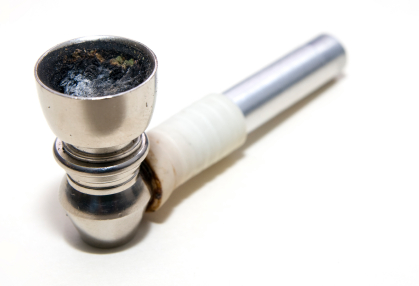Illinois law makes it a criminal offense to knowingly possess drug paraphernalia. The law does not distinguish between the type of drug the paraphernalia is used for. The penalties for possessing a pipe to smoke marijuana are the same as a needle to shoot heroin, even though heroin is regarded as a more dangerous drug.
The statute that criminalizes possession of drug paraphernalia is found in the criminal code at 720 ILCS 600/1 et seq. The law is called the Illinois Drug Paraphernalia Act, and it regulates both the possession and sale of drug paraphernalia.
Drug paraphernalia is defined as the following:
[A]ll equipment, products and materials of any kind, other than methamphetamine manufacturing materials as defined in Section 10 of the Methamphetamine Control and Community Protection Act, which are intended to be used unlawfully in planting, propagating, cultivating, growing, harvesting, manufacturing, compounding, converting, producing, processing, preparing, testing, analyzing, packaging, repackaging, storing, containing, concealing, injecting, ingesting, inhaling or otherwise introducing into the human body cannabis or a controlled substance in violation of the Cannabis Control Act, the Illinois Controlled Substances Act, or the Methamphetamine Control and Community Protection Act.
See 720 ILCS 600/2(d).
The statute provides a list of items which are drug paraphernalia, but indicates that the list is not exhaustive. That means a thing can constitute drug paraphernalia even though it does not appear on the list provided it meets the definition.
Drug paraphernalia used to inhale cannabis smoke includes pipes, one-hitters, bongs, dugouts, grinders, blimps, vaporizers, etc.
Needles, hypodermic needles and syringes used to inject heroin are also considered drug paraphernalia.
It is also illegal to possess any thing which is designed for or intended to be used in the cultivation of cannabis plants. These items are drug paraphernalia just like any pipe.
Possession of a pipe for marijuana and a syringe for heroin are punished the same. The offense of unlawful possession of drug paraphernalia (UPDP) is a Class A misdemeanor with a sentence of up to one year in jail and a fine of $2,500. See 720 ILCS 600/3.5. The court is permitted to sentence the defendant to probation as opposed to jail. Conviction results in a criminal record that can never be expunged or sealed.
One of the most severe consequences of possession of drug paraphernalia is a mandatory $750 that is paid on top of court costs. In addition, the defendant must forfeit the device, and is not compensated for its value.
It is illegal to possess drug paraphernalia, and also against the law to sell it. See 720 ILCS 600/3.
Despite the prohibition against drug paraphernalia in state law, Illinois has hundreds of retail stores (headshops) that sell drug paraphernalia. The legal loophole that allows these establishments to stay in business is that the law requires that the device must be intended for the unlawful use of drugs. See 720 ILCS 600/2(d).
If a smoking device can be used to smoke tobacco, then arguably it is not intended for smoking cannabis.
Selling paraphernalia is a Class 4 felony punishable by 1-3 years in the Department of Corrections and a possible fine of $25,000. If sold by a person who is 18 years of age or older to a person younger than 18, the sale of drug paraphernalia is an enhanced Class 3 felony (2-5 years prison and possible $25,000 fine). The sale of drug paraphernalia to a pregnant woman is punishable by a Class 2 felony (3-7 years prison and possible $25,000 fine). See, generally 720 ILCS 600/3.
A person who is authorized to possess hypodermic syringes has a defense to drug paraphernalia. Typically, if the person is diabetic or has some other health condition that allows them to possess needles, then they cannot be found guilty of possession of drug paraphernalia.
The issue in every drug possession or paraphernalia case is whether the police had lawful authority to get the paraphernalia.
If the police did not have probable cause or a warrant to search, then the evidence should be thrown out. A motion to quash arrest and suppress evidence should be considered in every case.
